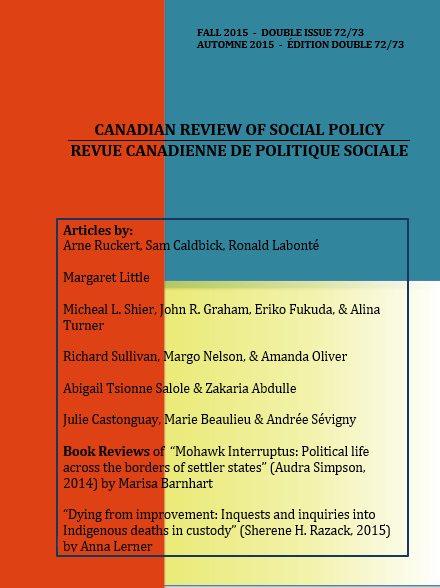Risk and protective factors of precarious housing among Aboriginal people living in urban centres in Alberta, Canada
Mots-clés :
Aboriginal, precarious housing, addictions, homeless, policyRésumé
In Canada, Aboriginal people are over-represented among people experiencing homelessness and other forms of precarious housing. In an effort to better understand the varied factors that might contribute to this situation, administrative data collected about individuals utilizing housing support services in seven Alberta, Canada cities were analyzed. Logistic regression was used to analyze the relationship between a categorical dependent variable measuring two housing situations (permanent/stable housing and precarious housing) and demographic, socio-economic, and personal health problem predictor variables for Aboriginal people within the study sample (n=1106). The analysis found that living in a larger city, having more income and education, and being married were all protective factors from being precariously housed. Having an addiction was found to be a risk factor for precarious housing. The findings suggest the need for more detailed investigation of the impact of addictions on housing for Aboriginal people along with an assessment of the types of housing resources available for Aboriginal people in smaller urban communities.
Résumé
Les Autochtones sont surreprésentés parmi les personnes sans domicile et en situation de logement précaire au Canada. Afin de mieux comprendre les divers facteurs qui peuvent contribuer à cette situation, les données administratives individuelles des personnes utilisant les services de soutien au logement dans sept villes d’Alberta, ont été analysés. Des modèles de régression logistique ont étés utilisés pour analyser la relation entre une variable qualitative dépendante mesurant deux situations de logement (logement permanent/stable et logement précaire), et des variables de prédiction dans l’échantillon (n=1106), tels les données démographiques et socio-économiques, et les problèmes de santé individuels. L’analyse démontre que vivre dans un centre urbain plus grand, avoir un revenu et un niveau d’éducation plus élevé, et être marié, sont tous des facteurs de protection contre le logement précaire. Un facteur de risque pour le logement précaire est d’avoir une toxicomanie. Les résultats de l’analyse suggèrent qu’une investigation plus approfondie des impacts de la toxicomanie sur la précarité au logement des Autochtones, une investigation des types de ressources en logement disponibles dans les communautés urbaines plus petites pour les Autochtones semble nécessaire.
Mots-clés: Autochtones; logement précaire; toxicomanie; itinérance; politique
Publié-e
Comment citer
Numéro
Rubrique
Licence
1-The author guarantees that the manuscript is an original work not published elsewhere in print or electronically in whole or in part, except in abstract form, that the author has the full power to make this contribution, and that the manuscript contains no matter libelous or otherwise unlawful or which invades the right of privacy or which infringes any proprietary right.
2-The author guarantees that the manuscript has not been previously published in print or electronically and that if the manuscript contains any tables, figures or images fully reproduced or closely adapted from previously published material, the author must obtain the necessary permission from the author/publisher holding the original copyright prior to publication in CRSP. The author may be required to produce evidence of permission granted to CRSP’s editors.
3-As a condition of publication in CRSP, the author assigns all copyright to CRSP, including but not limited to the right to publish, republish, and otherwise distribute this manuscript in print, electronic, or other formats. As CRSP is a non-profit interdisciplinary scholarly journal, the author will receive no royalty or other monetary compensation for the assignment set forth in this agreement.
For the purpose of full disclosure, CRSP will not normally use the content provided by the author in a commercial venture, but for the purpose of disseminating the author’s content to as many readers as possible. For distribution, third parties engaging in commercial activities may be contracted to distribute the content globally, and such parties may make a profit out of the author’s content in their normal course of business. CRSP will not pay the author or reimburse the author in any form based on such commercial activities because the conduct of such commercial activities is outside the control of CRSP.
Any future reference to or use of this published material by the authors must acknowledge CRSP as the original place of publication.
PERMISSION REQUEST/ARCHIVING
Permission is given to author(s) receiving funding via Tri-Council Agencies, the Canadian Institutes of Health Research (CIHR), the Natural Sciences and Engineering Research Council of Canada (NSERC) and the Social Sciences and Humanities Research Council (SSHRC), to make their publications freely available in an Open Access repository within the stated deadline by the Tri-Council Agencies (12 months following publication). Archiving of publication must be a manuscript copy bearing none of the CRSP headers, footers or any other distinguishing marks. No links to the article on the CRSP website is permitted.
Permission requests from third parties to reproduce articles in part or full in academic/educational publications can be directed to the managing editor of CRSP, and will not be unreasonably denied.

